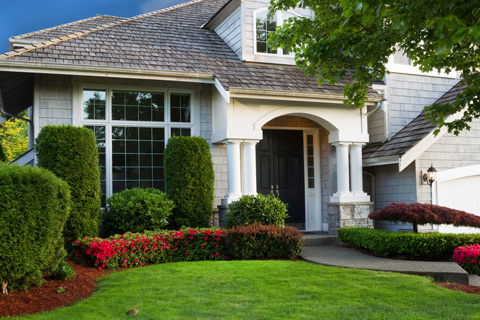
Trees, flowering shrubs, bushes, plants, and grass all work together to create a diverse ecosystem above and below the ground. While birds, insects, and other wildlife are attracted to the foliage, refuge, and blooms above, the roots are working below to find water, nutrients, and stability.
Choosing the right shrubs for your Alpharetta Ga landscape is a question of selecting ones that will thrive in the conditions of the environment where they are planted.
The team at 72tree.com has identified 4 shrub specimens that will enhance the natural beauty of your Alpharetta yard and landscape.
The USDA Hardiness Zone Map divides North America into 11 planting zones. Each individual planting zone is around 10°F colder (or warmer) than its neighboring zone –during an average winter.
At your local nursery or garden supply store, plant identification tags usually identify the zone in which that species will thrive.
The city of Alpharetta is located in zone 7b with a humid subtropical climate which supports the following striking species:
Juniper – juniperus
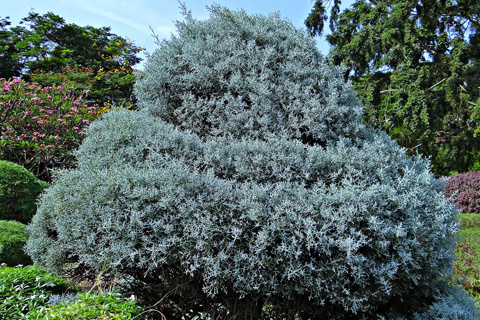
Junipers are long lived, slow growers, and rarely die. With a strong and extensive root system, they are able to adapt to their surrounding environment with ease. When planted in a location with ample space for growth, this specimen requires very little attention.
Juniper varieties vary in shape and size. The taller of the species can reach heights of more than 130 feet at maturity. The majority of the species however, are slow growing and will only reach about 30 feet in height, or 3 feet in diameter at maturity.
Junipers are evergreen and while they do not produce flowers or fruit, they do produce seeds.
Under the right conditions, this species can live from 400 to 700 years.
They are vulnerable to rust disease, which can be managed through pruning affected areas and treating them with fungicides.
Mountain Laurel – Kalmia latifolia
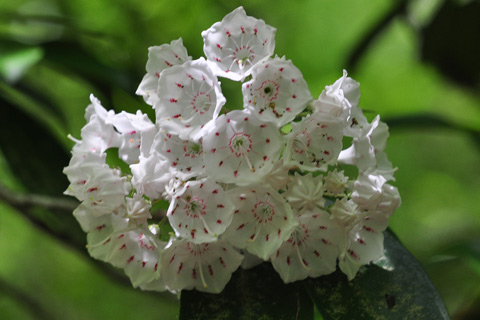
Mountain Laurels are relatively fast growers when properly planted. With a matted spreading root system, this shrub grows well in acidic well drained soil, and thrives when grown on north facing slopes or the east side of structures.
Mountain Laurel varieties are able to reach upwards of 25 feet, and if left to thrive without pruning, can grow into a large blooming thicket. Prolonged direct sunlight in summer months can stress this species. Take this into consideration when choosing its location.
This species is evergreen and produces flowers in terminal trusses of 50 to 150 blooms. Blooms range in color from white to pink and deep rose commonly with purple details. Flowering occurs in late spring (May and June).
This shrub however, is toxic. All of the green components – including the flowers, pollen, and twigs – contain andromedotoxin and is poisonous when ingested. If browsing animals consume enough of the plant, it can be lethal.
Mountain Laurel is vulnerable to leaf spot which can be managed through pruning affected areas and then treated with fungicides.
Rose of Sharon – Hibiscus Syriacus
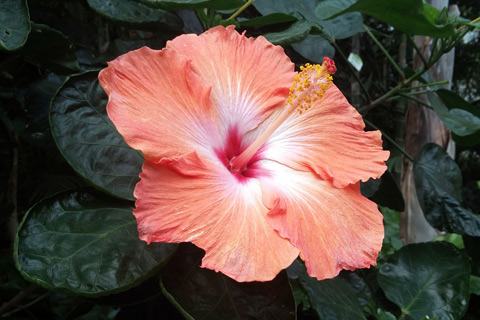
Rose of Sharon can be planted as a small tree or large shrub. It grows well in varied soil types but performs best in hot climates with moist soil and full sun.
At maturity, this species can reach up to 12 feet tall and grow 10 feet wide. Being multi-stemmed with vertical branches, it is relatively easy to grow, and requires minimal care. For this trait, Rose of Sharon is commonly used as hedging.
Rose of Sharon is a deciduous flowering shrub which with heavy pruning in early spring promotes flowering from July through September. Its flowers reach 2 to 4 inches in width, and blooms can range in color from pink, red, purple, white, and blue with a typically red center.
This species, if left unchecked, will reproduce and spread quickly in areas with little disturbance. Rose of Sharon is a vigorous and healthy species with high tolerance to pests and disease. When there is a problem with either, it is easily remedied through heavy pruning and with insecticides or fungicides.
Gardenia – Gardenia jasminoides
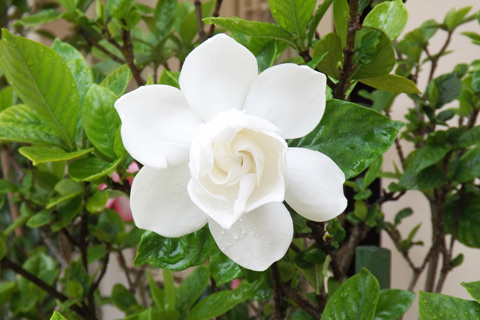
Gardenia can be planted as a small tree or large shrub. It thrives in acidic soil with good drainage, and flourishes in high humidity. This shrub grows best with night temperatures above 60 degrees, and mid to low 70’s during the day. Bright (not direct) sunlight is best for this species.
This shrub can typically grow up to 15 feet but some varieties are able to reach heights of 50 feet tall. With its many size and form variations, they are frequently used as hedges, ground cover, and even specimen plantings.
Gardenias are evergreen flowering shrubs and small trees that do require moderate attention and care. Flowering from April through July, the flowers can be solitary or in clusters; they range in color from white to pale yellow.
One of the greatest features of growing gardenias is its sweet scent. Once the species blooms however, the flowers quickly wilt when they come in contact with water.
Gardenias are highly susceptible to pest infestations. However, they can be easily managed with insecticidal soaps or horticultural oils. It also helps to maintain a high level of biodiversity in your garden which serves to attract predators of the insects threatening your garden.
Besides all of the artistic possibilities that come about on a landscape rich with trees and shrubs, during severe weather and strong winds, it is your shrubs and bushes that act as a wind buffer.
Shrubs and bushes do an excellent job at diverting wind, thus weakening it. This in turn spares the surrounding trees from taking the full force of potentially damaging winds.
Likewise, the bushes planted around your home will help shield it when the cold winter winds begin to blow.
A healthy garden and landscape will have a variety of thriving tree, plant, and shrub species. Throughout the blooming season, as each species flowers, it attracts different insects and wildlife.
This biodiversity helps to stave off infestations. Likewise, the co-mingling of roots and fungi (in fertile soil) help to create a thriving mycorrhizal network below the soil that works to impede invasive diseases.
Remember to have a plan in mind when acquiring plants and shrubs for your garden and landscape. Not all shrubs can be planted equally, but they all can thrive in the right environment.
Sources:
http://buckjones.com/trees-shrubs-how-to-choose/
https://www.michigandnr.com/publications/pdfs/huntingwildlifehabitat/Landowners_Guide/Resource_Dir/Acrobat/Trees_and_Shrubs.PDF
http://www.lot-lines.com/5-reasons-to-reconsider-your-hatred-of-juniper-bushes/
https://en.wikipedia.org/wiki/Kalmia_latifolia
https://extension.psu.edu/mountain-laurel-diseases
https://www.uaex.edu/yard-garden/resource-library/plant-week/mountain-laurel-6-15-12.aspx
http://www.hort.uconn.edu/plants/detail.php?pid=204
https://communityenvironment.unl.edu/plant-month-rose-sharon
http://homeguides.sfgate.com/rose-sharon-tree-41486.html
http://gardeningsolutions.ifas.ufl.edu/plants/ornamentals/gardenias.html
https://en.wikipedia.org/wiki/Gardenia
https://plants.ces.ncsu.edu/plants/all/gardenia-augusta-g-jasminoides/